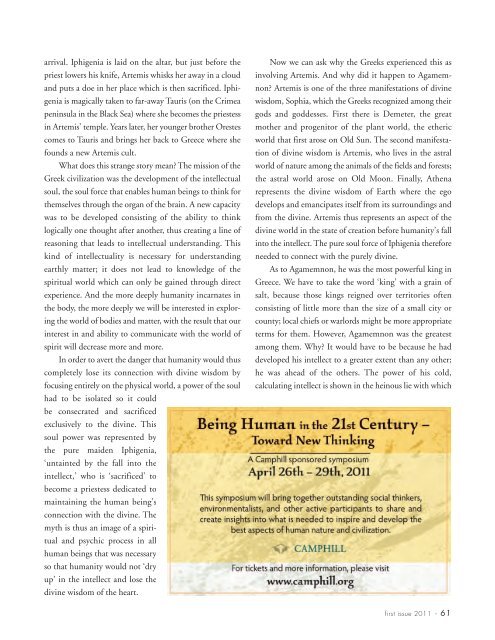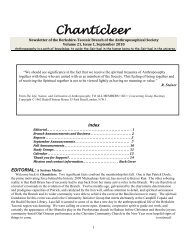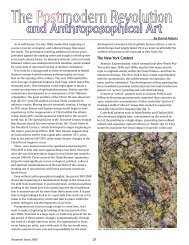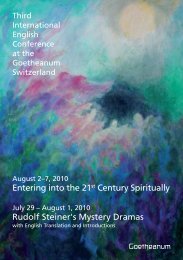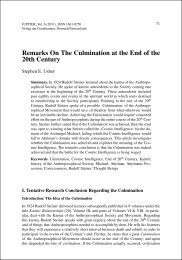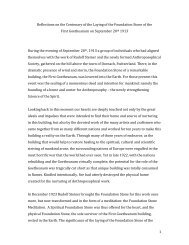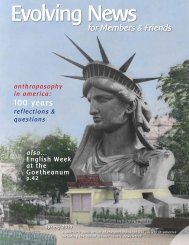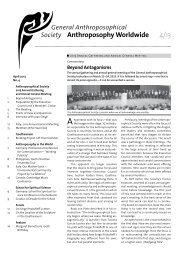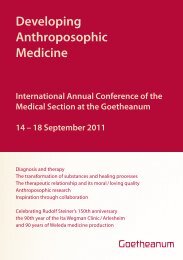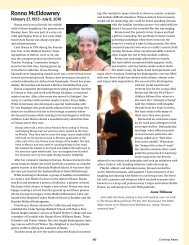Rudolf Steiner's Vision for the Future - Anthroposophical Society in ...
Rudolf Steiner's Vision for the Future - Anthroposophical Society in ...
Rudolf Steiner's Vision for the Future - Anthroposophical Society in ...
Create successful ePaper yourself
Turn your PDF publications into a flip-book with our unique Google optimized e-Paper software.
arrival. Iphigenia is laid on <strong>the</strong> altar, but just be<strong>for</strong>e <strong>the</strong><br />
priest lowers his knife, Artemis whisks her away <strong>in</strong> a cloud<br />
and puts a doe <strong>in</strong> her place which is <strong>the</strong>n sacrificed. Iphigenia<br />
is magically taken to far-away Tauris (on <strong>the</strong> Crimea<br />
pen<strong>in</strong>sula <strong>in</strong> <strong>the</strong> Black Sea) where she becomes <strong>the</strong> priestess<br />
<strong>in</strong> Artemis’ temple. Years later, her younger bro<strong>the</strong>r Orestes<br />
comes to Tauris and br<strong>in</strong>gs her back to Greece where she<br />
founds a new Artemis cult.<br />
What does this strange story mean? The mission of <strong>the</strong><br />
Greek civilization was <strong>the</strong> development of <strong>the</strong> <strong>in</strong>tellectual<br />
soul, <strong>the</strong> soul <strong>for</strong>ce that enables human be<strong>in</strong>gs to th<strong>in</strong>k <strong>for</strong><br />
<strong>the</strong>mselves through <strong>the</strong> organ of <strong>the</strong> bra<strong>in</strong>. A new capacity<br />
was to be developed consist<strong>in</strong>g of <strong>the</strong> ability to th<strong>in</strong>k<br />
logically one thought after ano<strong>the</strong>r, thus creat<strong>in</strong>g a l<strong>in</strong>e of<br />
reason<strong>in</strong>g that leads to <strong>in</strong>tellectual understand<strong>in</strong>g. This<br />
k<strong>in</strong>d of <strong>in</strong>tellectuality is necessary <strong>for</strong> understand<strong>in</strong>g<br />
earthly matter; it does not lead to knowledge of <strong>the</strong><br />
spiritual world which can only be ga<strong>in</strong>ed through direct<br />
experience. And <strong>the</strong> more deeply humanity <strong>in</strong>carnates <strong>in</strong><br />
<strong>the</strong> body, <strong>the</strong> more deeply we will be <strong>in</strong>terested <strong>in</strong> explor<strong>in</strong>g<br />
<strong>the</strong> world of bodies and matter, with <strong>the</strong> result that our<br />
<strong>in</strong>terest <strong>in</strong> and ability to communicate with <strong>the</strong> world of<br />
spirit will decrease more and more.<br />
In order to avert <strong>the</strong> danger that humanity would thus<br />
completely lose its connection with div<strong>in</strong>e wisdom by<br />
focus<strong>in</strong>g entirely on <strong>the</strong> physical world, a power of <strong>the</strong> soul<br />
had to be isolated so it could<br />
be consecrated and sacrificed<br />
exclusively to <strong>the</strong> div<strong>in</strong>e. This<br />
soul power was represented by<br />
<strong>the</strong> pure maiden Iphigenia,<br />
‘unta<strong>in</strong>ted by <strong>the</strong> fall <strong>in</strong>to <strong>the</strong><br />
<strong>in</strong>tellect,’ who is ‘sacrificed’ to<br />
become a priestess dedicated to<br />
ma<strong>in</strong>ta<strong>in</strong><strong>in</strong>g <strong>the</strong> human be<strong>in</strong>g’s<br />
connection with <strong>the</strong> div<strong>in</strong>e. The<br />
myth is thus an image of a spiritual<br />
and psychic process <strong>in</strong> all<br />
human be<strong>in</strong>gs that was necessary<br />
so that humanity would not ‘dry<br />
up’ <strong>in</strong> <strong>the</strong> <strong>in</strong>tellect and lose <strong>the</strong><br />
div<strong>in</strong>e wisdom of <strong>the</strong> heart.<br />
Now we can ask why <strong>the</strong> Greeks experienced this as<br />
<strong>in</strong>volv<strong>in</strong>g Artemis. And why did it happen to Agamemnon?<br />
Artemis is one of <strong>the</strong> three manifestations of div<strong>in</strong>e<br />
wisdom, Sophia, which <strong>the</strong> Greeks recognized among <strong>the</strong>ir<br />
gods and goddesses. First <strong>the</strong>re is Demeter, <strong>the</strong> great<br />
mo<strong>the</strong>r and progenitor of <strong>the</strong> plant world, <strong>the</strong> e<strong>the</strong>ric<br />
world that first arose on Old Sun. The second manifestation<br />
of div<strong>in</strong>e wisdom is Artemis, who lives <strong>in</strong> <strong>the</strong> astral<br />
world of nature among <strong>the</strong> animals of <strong>the</strong> fields and <strong>for</strong>ests;<br />
<strong>the</strong> astral world arose on Old Moon. F<strong>in</strong>ally, A<strong>the</strong>na<br />
represents <strong>the</strong> div<strong>in</strong>e wisdom of Earth where <strong>the</strong> ego<br />
develops and emancipates itself from its surround<strong>in</strong>gs and<br />
from <strong>the</strong> div<strong>in</strong>e. Artemis thus represents an aspect of <strong>the</strong><br />
div<strong>in</strong>e world <strong>in</strong> <strong>the</strong> state of creation be<strong>for</strong>e humanity’s fall<br />
<strong>in</strong>to <strong>the</strong> <strong>in</strong>tellect. The pure soul <strong>for</strong>ce of Iphigenia <strong>the</strong>re<strong>for</strong>e<br />
needed to connect with <strong>the</strong> purely div<strong>in</strong>e.<br />
As to Agamemnon, he was <strong>the</strong> most powerful k<strong>in</strong>g <strong>in</strong><br />
Greece. We have to take <strong>the</strong> word ‘k<strong>in</strong>g’ with a gra<strong>in</strong> of<br />
salt, because those k<strong>in</strong>gs reigned over territories often<br />
consist<strong>in</strong>g of little more than <strong>the</strong> size of a small city or<br />
county; local chiefs or warlords might be more appropriate<br />
terms <strong>for</strong> <strong>the</strong>m. However, Agamemnon was <strong>the</strong> greatest<br />
among <strong>the</strong>m. Why? It would have to be because he had<br />
developed his <strong>in</strong>tellect to a greater extent than any o<strong>the</strong>r;<br />
he was ahead of <strong>the</strong> o<strong>the</strong>rs. The power of his cold,<br />
calculat<strong>in</strong>g <strong>in</strong>tellect is shown <strong>in</strong> <strong>the</strong> he<strong>in</strong>ous lie with which<br />
first issue 2011 • 61


